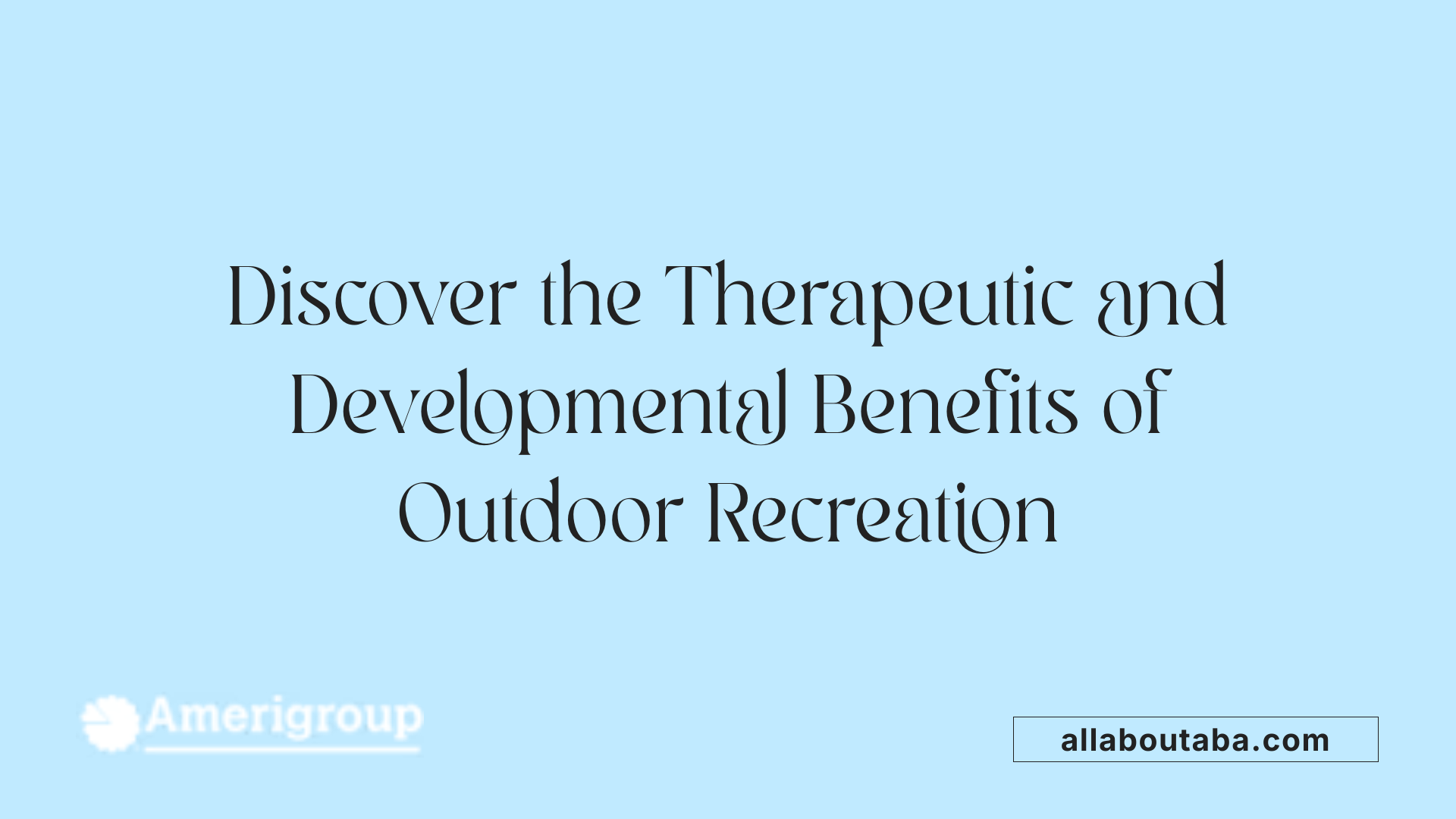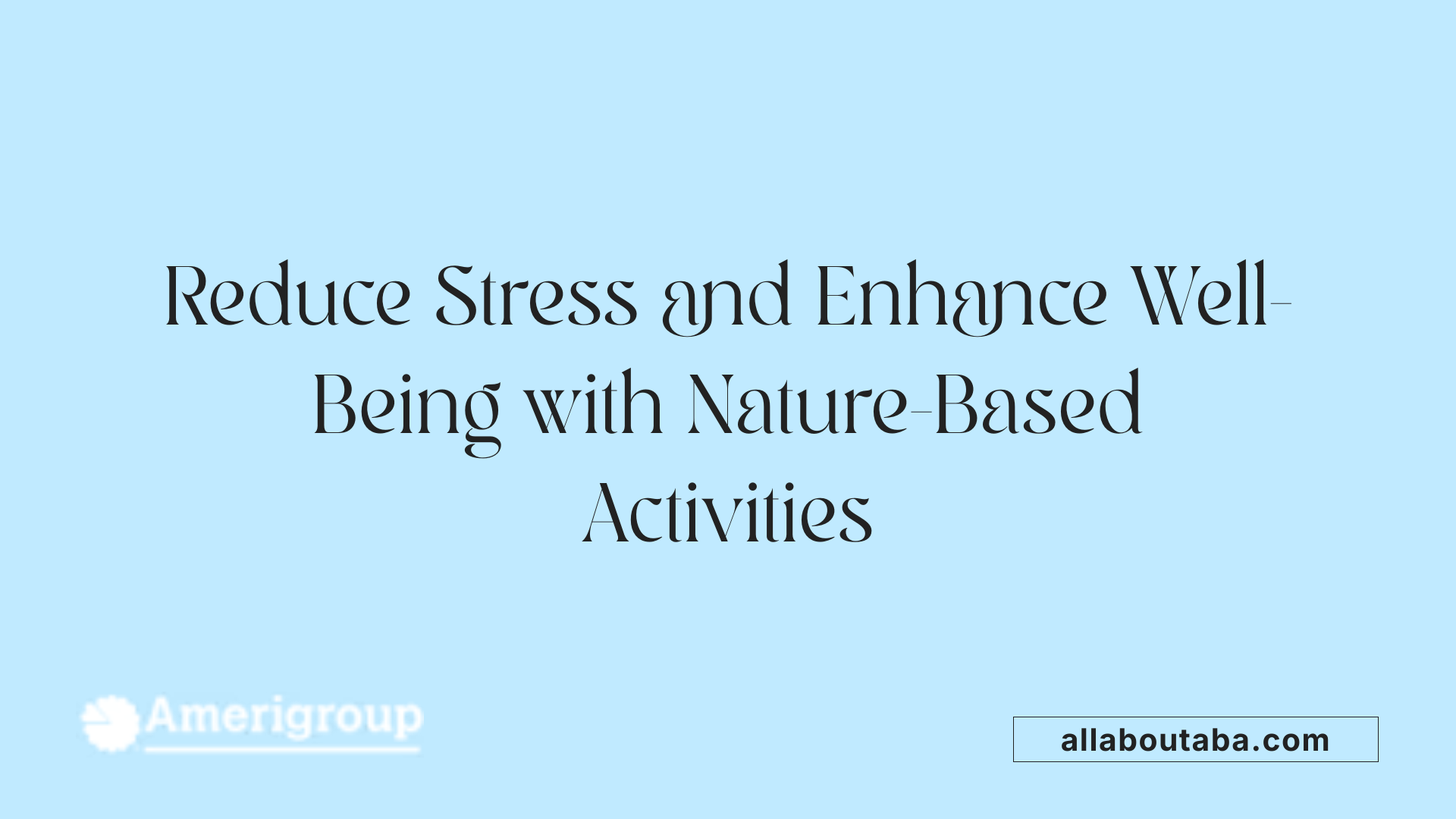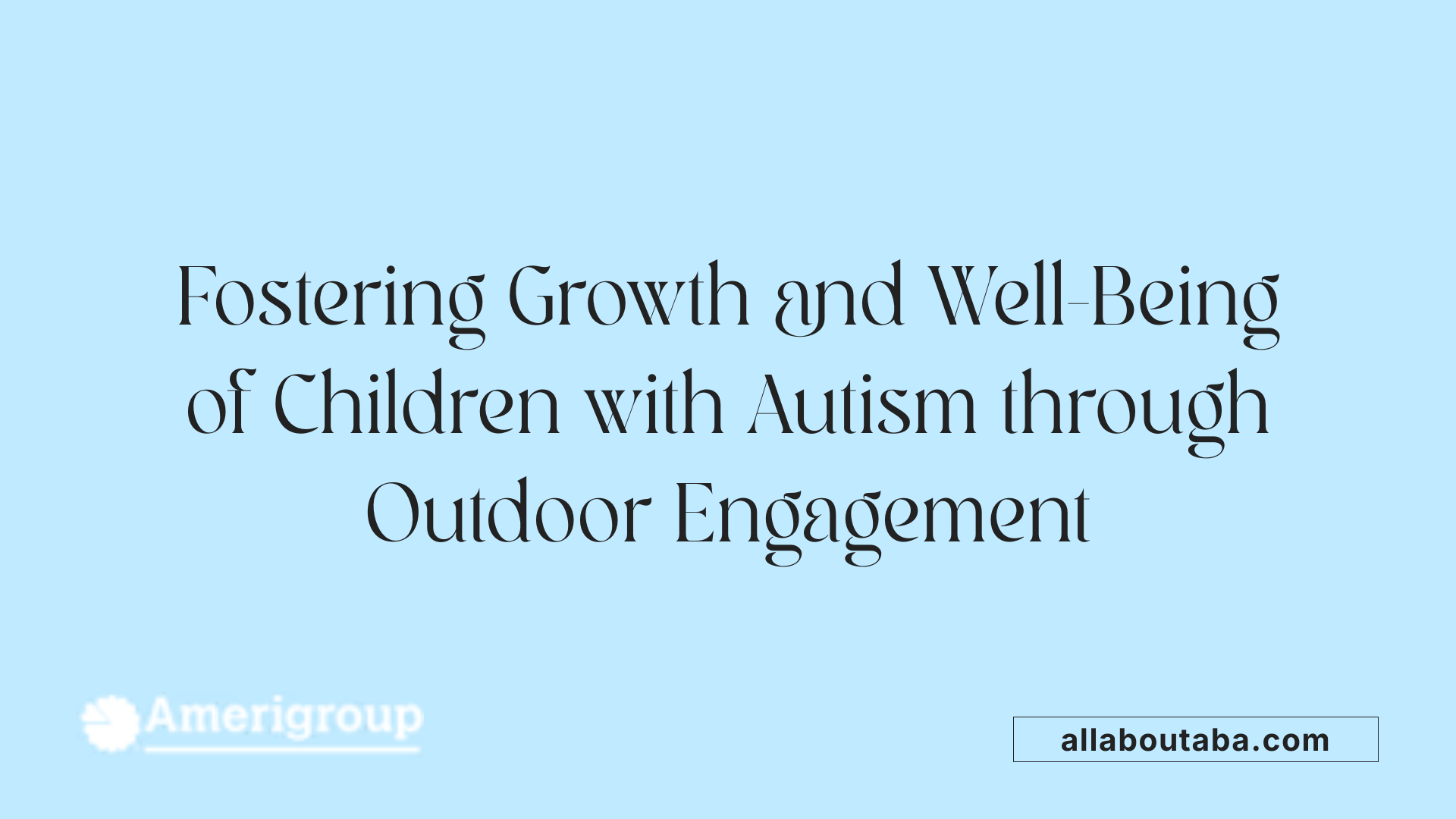Exploring the Benefits of Outdoor Group Engagement for Autistic Individuals
Outdoor group activities are increasingly recognized as a vital component of support for individuals with autism. These experiences provide not only therapeutic benefits but also opportunities for social integration, physical development, and emotional well-being. This article explores how outdoor recreational and group activities foster growth, improve quality of life, and support the holistic development of autistic individuals.
Enhancing Social Skills and Building Confidence through Group Play
What are the benefits of outdoor group activities for individuals with autism?
Outdoor group activities bring a variety of positive outcomes for people with autism. These activities provide a natural setting where individuals can practice essential social skills such as communication, cooperation, and turn-taking. Participating in activities like hiking, camping, kayaking, or nature walks allows them to interact in a relaxed environment that promotes learning and growth.
One of the significant advantages of outdoor activities is the exposure to natural stimuli—sunlight, water, textures, and fresh air—which can help improve sensory processing and emotional regulation. These stimuli often lead to reduced stress levels and better mental focus. For children and adults alike, engaging with nature can foster a calming effect, helping to manage anxiety and promote relaxation.
Physical activities involved in outdoor play, such as balancing, coordination, and movement exercises, contribute to improving motor skills, strength, and overall physical health. These benefits extend beyond physical development and support greater independence, resilience, and self-confidence. Through overcoming challenges in outdoor settings, individuals develop a sense of achievement and self-efficacy.
Structured routines and clear goals in outdoor activities are crucial. They help reduce uncertainty and anxiety, creating a supportive environment where individuals can thrive. Consistent routines also aid in skill generalization, which means skills learned outdoors can transfer to other settings like school or community activities.
Moreover, outdoor group activities foster a sense of community and belonging. Team-based experiences encourage trust, collaboration, and social bonding, which are vital for emotional well-being. When participants are involved in shared goals and cooperative play, they build friendships and develop social competence.
Research supports these benefits, indicating that nature-based recreation significantly enhances cognitive development, emotional regulation, and social engagement for individuals on the autism spectrum. These experiences nurture independence and confidence as individuals learn to navigate new environments and challenges.
In summary, outdoor group activities are a comprehensive approach to supporting individuals with autism. They promote physical health, sensory regulation, social skills, and emotional resilience, ultimately improving quality of life and well-being.
Therapeutic and Developmental Advantages of Nature-Based Recreation

What therapeutic and developmental advantages do outdoor recreational activities offer to autistic individuals?
Engaging in outdoor recreational activities provides a wealth of benefits for individuals with autism. Nature-based activities such as hiking, gardening, or water play are not only enjoyable but also serve as therapeutic tools that support various aspects of development.
One significant advantage is the improvement in sensory integration. Natural environments offer diverse sensory inputs—such as visual stimuli from plants and movement, auditory stimulation from nature sounds, and tactile experiences through contact with soil, leaves, or water. These sensory inputs can help individuals regulate their emotions and reduce feelings of stress and anxiety, which are common challenges.
Research supports these observations, indicating that contact with nature fosters emotional regulation and mental calmness. The natural setting's calming atmosphere can help improve mood and overall mental health, enabling individuals to better manage their emotional responses.
Beyond sensory benefits, outdoor activities significantly enhance physical health and motor skills. Activities like biking, obstacle courses, or water play improve fundamental motor skills such as balance, coordination, and visual-motor control. These skills are often areas of difficulty among people with autism, and targeted outdoor activities can help address these challenges.
Outdoor recreation also facilitates crucial social skills development. Participating in group activities like horseback riding, team sports, or community hikes encourages trust, communication, and teamwork. These shared experiences promote social bonding and help build a sense of community.
Furthermore, outdoor activities foster independence and self-efficacy. When individuals learn new skills through outdoor challenges or games, they gain confidence and a sense of achievement. Structured routines and clear goals during outdoor sessions help reduce anxiety and motivate participation.
Engaging with nature can also enhance social engagement and trust. Activities requiring cooperation foster interpersonal skills, such as sharing, turn-taking, and cooperation. These experiences are vital for personal growth and social inclusion.
In addition, outdoor experiences promote cognitive development. The problem-solving involved in navigating outdoor environments, coupled with the sensory-rich setting, supports cognitive flexibility and attention span.
Supportive strategies, including gradual exposure, predictable routines, sensory supports, and clear communication, maximize these benefits, helping individuals feel comfortable and engaged.
In summary, outdoor recreational activities are invaluable in promoting sensory, emotional, motor, and social growth in autistic individuals. They provide a natural, engaging, and adaptable platform for holistic development that can be tailored to each person's needs.
How do outdoor activities improve sensory integration and emotional regulation?
Natural settings provide varied sensory stimuli that help refine sensory processing and enhance emotional balance. This results in a calmer demeanor, reduced anxiety, and improved mood.
How does community building occur through outdoor recreation?
Group outdoor activities foster trust, teamwork, and social engagement, helping individuals develop friendships and social skills.
What specific outdoor activities are beneficial?
Activities such as camping, hiking, biking, kayaking, gardening, water play, and obstacle courses are all beneficial for their sensory, motor, and social benefits.
What strategies ensure successful outdoor recreation?
Gradual exposure, predictable routines, sensory supports, and clear communication are essential to help individuals with autism feel safe and motivated during outdoor activities.
Impact of Outdoor Activities on Stress and Mental Well-Being

How do outdoor activities impact stress levels and quality of life for people with autism?
Engaging in outdoor activities brings numerous benefits for individuals on the autism spectrum, particularly in reducing perceived stress and improving overall quality of life. Activities set in natural environments create calming atmospheres that help soothe emotional disturbances and foster better emotional regulation.
Research highlights that contact with nature supports mental focus, aids recovery from mental fatigue, and promotes happiness and healthfulness. Nature-based pursuits such as hiking, camping, biking, kayaking, and gardening offer diverse sensory inputs that enhance sensory processing and motor skills.
Participation in outdoor recreation not only alleviates stress but also encourages social bonds. Group activities foster collaboration, trust, and community feeling, which are vital for social development. These shared experiences can improve communication skills, build friendships, and boost confidence.
Structured routines with clear goals in outdoor programs can decrease anxiety, especially for individuals with autism who thrive on predictability. As they learn new skills and overcome challenges, their sense of independence and self-efficacy grows, contributing to happiness and improved self-esteem.
Outdoor activities serve as therapeutic tools that promote emotional stability. The natural environment's sensory diversity helps with sensory regulation and provides a refuge for calmness during times of heightened stress.
Participation in physical activities like adaptive yoga, water play, or obstacle courses further supports motor development, balance, and coordination, which are often areas of challenge for autistic individuals. Exercise releases endorphins, natural mood lifters, reducing anxiety and fostering mental well-being.
In summary, outdoor recreational activities significantly impact stress reduction and mental health for people with autism. They improve mood, facilitate emotional regulation, and elevate quality of life while providing opportunities for growth, social engagement, and autonomy.
| Effect Area | Outdoor Activity Type | Benefits | Additional Notes |
|---|---|---|---|
| Stress reduction | Nature walks, water play | Calms mind, reduces anxiety | Suitable for all ages |
| Emotional regulation | Gardening, obstacle courses | Enhances mood, emotional balance | Incorporates sensory input |
| Social skills | Group sports, kayaking | Builds trust, communication | Promotes teamwork |
| Motor development | Adaptive yoga, biking | Improves coordination, balance | Develops physical independence |
| Confidence and independence | Camping, hiking | Fosters self-efficacy, autonomy | Encourages problem-solving |
This comprehensive participation in outdoor activities supports mental well-being by addressing stress and fostering emotional and social growth. It underscores the importance of accessible, structured outdoor recreation programs tailored for individuals with autism, laying a foundation for lifelong benefits.
Supporting Overall Development of Children with Autism via Outdoor Engagement

How do outdoor group activities support the well-being and overall development of children with autism?
Outdoor group activities play a vital role in nurturing the growth and health of children with autism. These activities provide a diverse range of sensory experiences that are instrumental in improving sensory processing skills. For example, engaging in nature walks, water play, gardening, and obstacle courses expose children to visual, tactile, auditory, and proprioceptive inputs, which can enhance sensory integration and help reduce sensory overload or under-responsiveness.
Beyond sensory benefits, outdoor activities foster social communication and cooperation. Participating in team sports, group hikes, kayaking, and outdoor games helps children develop essential social skills such as sharing, turn-taking, and verbal and non-verbal communication. These shared experiences promote trust and friendship, building a sense of community and belonging.
Physical activity is another crucial aspect supported by outdoor engagement. Movement-based activities improve motor skills, strength, coordination, balance, and spatial awareness. They also contribute to overall physical health, reducing the risk of sedentary lifestyle-related issues.
Research highlights that outdoor environments can significantly lower stress, anxiety, and irritability in children with autism. Natural settings create a calming atmosphere that promotes emotional regulation and mental well-being. Engaging with nature helps children develop resilience and self-regulation, essential for managing daily challenges.
Structured routines and clear, achievable goals in outdoor activities can reduce anxiety and facilitate motivation. These elements foster independence and confidence as children learn new skills and overcome challenges with appropriate support.
In addition, outdoor activities serve as an effective platform for generalizing skills learned in therapy and educational settings. Children can practice social interactions, motor skills, and problem-solving in real-world environments, aiding their readiness for school and community participation.
Overall, outdoor group activities harness the natural environment's therapeutic and developmental potential, offering holistic benefits that encompass sensory processing, social skills, physical health, and emotional well-being, vital for children with autism.
How do sensory experiences improve sensory processing?
Engaging with varied sensory stimuli in outdoor settings enhances the brain's ability to organize and respond to sensory information more effectively. This can lead to better attention, reduced sensory sensitivities, and improved emotional regulation. Activities such as water play, gardening, and obstacle courses introduce new textures, sights, sounds, and movement patterns. These experiences promote sensory integration, helping children better interpret and react to sensory input in daily life.
How does outdoor activity boost social communication and cooperation?
Interaction during outdoor activities encourages children to communicate, share, and work together. Participating in group sports or cooperative games develops skills such as listening, verbal exchanges, and non-verbal cues. These collaborative efforts foster mutual understanding, empathy, and trust, laying a foundation for lasting friendships.
What are the physical benefits of outdoor activities for children with autism?
Movement-rich activities improve fundamental motor skills like balance, coordination, and strength. These are often areas of challenge for children with autism. Regular outdoor exercise boosts cardiovascular health, enhances muscle development, and promotes overall physical fitness, which in turn supports cognitive and emotional development.
| Aspect | Benefit | Example Activities | Additional Notes |
|---|---|---|---|
| Sensory Processing | Enhances integration | Gardening, water play | Facilitates better sensory responses |
| Social Skills | Improves communication & cooperation | Group sports, team hikes | Builds trust and friendships |
| Motor Skills | Increases coordination, balance | Obstacle courses, biking | Develops physical competence |
| Emotional Well-being | Reduces stress & anxiety | Nature walks, outdoor relaxation | Promotes calm and focus |
Overall, outdoor engagement offers multidimensional support that fosters the development of communication, social cooperation, motor skills, and emotional regulation, helping children with autism thrive in various aspects of life.
Natural Settings as Calming and Therapeutic Environments

What are the calming and therapeutic benefits of natural outdoor environments for individuals with autism?
Natural environments serve as soothing spaces that can significantly aid individuals with autism in managing their emotional and sensory challenges. These settings offer a calm and welcoming atmosphere that facilitates emotional regulation, helping reduce feelings of stress and anxiety.
Engaging with nature provides a rich array of sensory inputs—such as sounds of birds, the sight of greenery, or the tactile experience of leaves and water—that can support sensory processing. This diverse sensory stimulation can be especially beneficial for individuals with sensory integration difficulties, promoting a sense of calm and helping them feel more centered.
Research indicates that outdoor environments foster emotional stability and resilience. The natural world’s inherently relaxing qualities help individuals recover from mental fatigue and enhance mood, making outdoor settings ideal for therapeutic activities focused on emotional and sensory regulation.
Moreover, exposure to nature can boost overall mental health, fostering feelings of happiness and well-being. Activities like walking in a park, gardening, or simply being in natural surroundings can reduce emotional fluctuations and promote calmness.
In summary, natural outdoor spaces are more than just pleasant environments—they are therapeutic arenas that promote emotional well-being through controlled sensory experiences, helping individuals with autism manage their emotional responses more effectively. These benefits highlight the importance of incorporating outdoor activities into therapeutic and daily routines, making the natural world a valuable resource for emotional and sensory support.
Fostering Inclusion and Community Connection through Outdoor Activities
How do outdoor group activities support well-being and development in people with autism?
Participation in outdoor activities plays a vital role in supporting the well-being and growth of individuals with autism. These activities provide a natural setting for developing social skills, building trust, and forming meaningful friendships.
Outdoor group experiences encourage teamwork and shared experiences, helping participants learn how to communicate effectively and collaborate. For example, activities like hiking, camping, kayaking, and nature walks promote inclusiveness by bringing individuals together in a common setting, fostering a sense of community.
Engagement in these activities offers opportunities for individuals with autism to practice decision-making, problem-solving, and independence. Such experiences can reduce reliance on caregivers, increase self-efficacy, and promote autonomy.
Moreover, outdoor interactions often include sensory engagement, which can improve sensory processing and emotional regulation. The calming effects of natural settings, combined with social participation, enhance mood and decrease stress and anxiety.
Building relationships through outdoor activities boosts self-esteem and supports positive identity development. These social bonds and a sense of belonging are essential for overall developmental progress and mental health.
The benefits extend beyond immediate social skills to include broader community involvement. When individuals with autism participate in shared outdoor activities, they are more likely to develop contact with community members, increase social inclusion, and foster a supportive network.
Overall, outdoor activities facilitate personal growth, stronger social bonds, and greater inclusion, which are crucial for improving quality of life for people with autism.
Promoting inclusivity and teamwork
Integrating structured routines and setting clear, achievable goals within outdoor activities can reduce anxiety and enhance motivation for individuals with autism. Activities designed with sensory supports and predictable patterns help participants feel secure and included.
Group-based outdoor experiences teach important social skills and promote a sense of belonging. Whether through team sports or collective exploration, these activities foster mutual trust and help build enduring friendships.
Encouraging personal autonomy and community involvement
Outdoor activities empower individuals with autism to develop new skills and explore their abilities, boosting confidence and independence. As they navigate challenges and succeed in tasks such as setting up camp or completing a nature trail, they gain a sense of achievement.
Participation also encourages community involvement by making individuals active members of their community, creating opportunities for social contacts and community service. These experiences promote self-efficacy and help individuals see themselves as capable and valued members of society.
In conclusion, outdoor group activities are a powerful tool for building community, fostering inclusion, and promoting holistic development in people with autism. They support emotional, social, and cognitive growth while nurturing a sense of belonging and personal achievement.
Additional insights on community building through outdoor activities in autism
| Activity Type | Benefits | Additional Notes |
|---|---|---|
| Nature walks | Improves sensory processing, emotional regulation | Can be tailored to individual preferences |
| Water play | Reduces anxiety, encourages trust | Suitable for all ages |
| Gardening | Enhances motor skills, patience | Promotes environmental awareness |
| Group sports | Fosters teamwork, communication | Adaptable to skill levels |
| Adaptive yoga | Builds body awareness, reduces stress | Incorporates sensory supports |
This comprehensive approach to outdoor recreation underscores its importance in enhancing social inclusion, independence, and overall quality of life for individuals with autism.
The Transformative Power of Nature in Autism Support
Harnessing the natural world through outdoor group activities offers a profound avenue for improving the lives of individuals with autism. These experiences nurture social skills, reduce stress, and foster physical and emotional growth. When thoughtfully structured and supported, outdoor activities can serve as powerful tools for personal development, community engagement, and mental health, making a meaningful difference in the well-being and overall quality of life for autistic individuals.
References
- Participation in Recreational Activities Buffers the Impact ...
- ASD: Benefits of Exercise & Outdoor Experiences
- The Importance of Outdoor Recreation: A Pathway to ...
- Outdoor Activities for Kids with Autism: Fun & Growth
- The Power of Movement: Benefits of Outdoor Exercise for ...
- Autism and recreation
- 10 Benefits of Outdoor Activities for Children with Autism
- The Importance of Outdoor Recreation: A Pathway to ...
- Participation in Recreational Activities Buffers the Impact ...
- The Power of Movement: Benefits of Outdoor Exercise for ...







